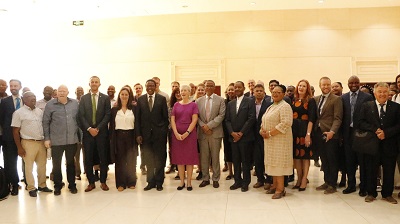By: Nthati Moerane
Maseru.
The National University of Lesotho‘s (NUL) Energy Research Centre in collaboration with Bethel Business and Community Development Centre (BBCDC), along with partners from the Finland Futures Research Centre at the University of Turku, and LinnaeusUniversity of Sweden, officially launched theERASMUS+LETSEMA project.
LETSEMA is known as Low-Carbon Economy Transformation through Sustainable Energy Modernization and access in Lesotho, it was officially launched on February29th 2024, at Manthabiseng Convention Centre, Maseru, Lesotho. It is a programme which aims to deliver good quality renewable energy, renewable Lesotho, and the global gateway.
According to Osku Haapassari from the University of Turku, the programme’s specific objectives include the development of institutional capacities of NUL and BBCDC in management, administration, monitoring and evaluation to foster international collaboration through networks, mobility and projects. To improve equitable access of higher educational institutions and vocational students to digital and high-quality learning opportunities in the field of sustainable energy and research.
He further explained the plan to enhance capabilities of NUL and BBCDC to provide high quality hands-on learning opportunities to students in the field of sustainable energy through student projects, practical placements, and laboratory work and entrepreneur initiatives. Haapassari states the wider objective as the promotion of the capabilities of NUL and BBCDC to provide equitable, digital and future oriented quality education on sustainable energy that promotes inclusiveness, diversity and creation of green jobs and growth opportunities.
Recognising the importance of investing in skills development to drive sustainable energy solutions, LETSEMA aims to equip aspiring professionals with the expertise needed to navigate the evolving landscape of renewable energy and energy efficiency. Also to strengthen and promote sustainable energy practices in Lesotho by promoting the uptake of renewable energy and energy efficiency solutions, while improving access to digital, high-level and hands-on learning. The covid-19 pandemic highlighted how digital tools can improve access to education and encourage international cooperation.
“From my perspective I’m just happy that from the education side, we are expanding so as a lecturer it means we are going to have collaboration with other academic sides in the country with different perspectives with regard to this energy centre. AlsoI am happy for my students because they will have different areas to go to,”said ‘Mabotle Maphika who is a member of the Energy Research Centre and a lecturer at NUL.
“The problem is that there is a gap between the people from the university because they do not have that much hand on practice versus those from the vocational, so this project will help fill that gap by making collaborations and providing access to the needed equipment,” said Rets’elisitsoe Thamae, a lecture from the University of Lesotho.
Present dignitaries purposed to foresee the official launch of the project included the minister of Energy Hon. Professor NqosaMahao, minister of Education and Training (MoET), Hon. Professor NtoiRapapa, European Union (EU) ambassador to Lesotho, H.E Paola Amadei, Trade and Economic counsellor at the embassy of Sweden, Martin Jörnrud, and the Education and Science counsellor at the Embassy of Finland Lina Soiri.
Co-funded by the Erasmus+ programme of the European Union, with a budget of €399 363 (M7,867,260) the Erasmus+ programme underpins the EU’s efforts in supporting education, training, youth and sport. The 2021-2027 programme places a strong focus on social inclusion, the green and digital transitions, and promoting young people’s participation in democratic life. The LETSEMA project was selected under the capacity building in Higher Education stream of the Erasmus+ programme. It officially started its implementation in July 2023 and the activities are planned for 3 years in total.
Renewable Energy Lesotho is aligned with the Sustainable Development Goals(SDGs) and particularly SDG 7(affordable and clean energy) as well as the Government of Lesotho’s National Strategic Development Plan II(NSDP II), the EU- Lesotho cooperation Strategy for 2021-2027 and Team Europe Initiative-Green Deal and is part of the Global Gateway, Europe’s strategy to boostsmart,clean and secure connections in digital, energy and transport sectors, and to strengthen health, education and research systems across the world.
In summary of the launch, it was stated that for the 2050 challenge, 9.7 billion people worldwide need 55% more food, 60% of more water and 80% of more energy. Understanding complexities in the development is crucial in the execution of sustainable energy challenges; climate change, urbanisation, energy security, socio-technical transitions. Integrated approaches for resolving development challenges to accelerate quality, resilience and economic impact by education design, and also transforming sustainable development knowledge into practice hands on skills through education.


